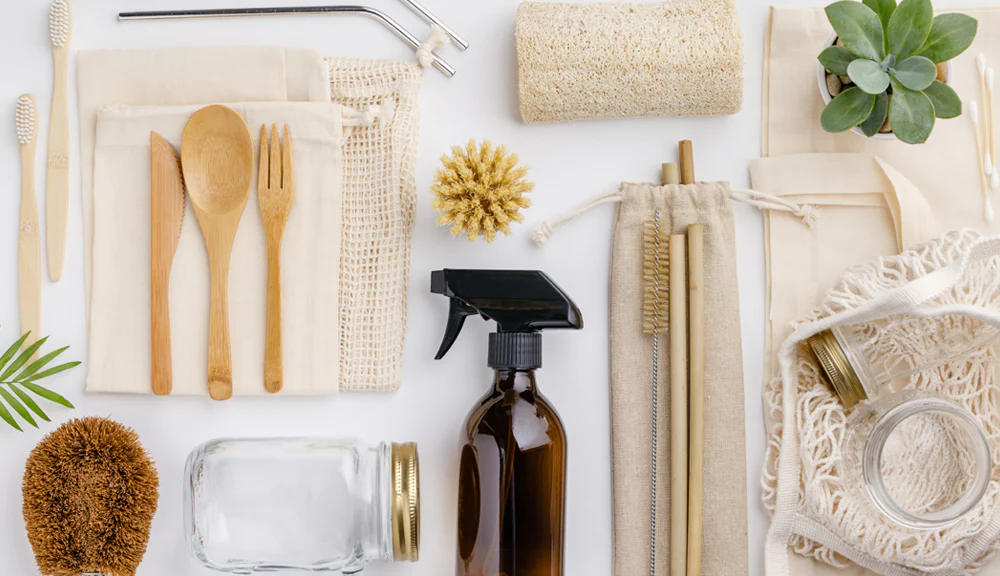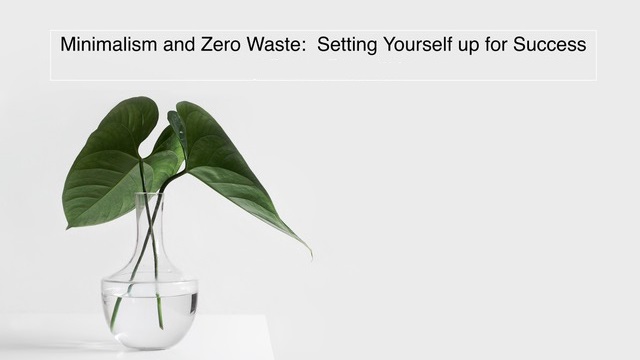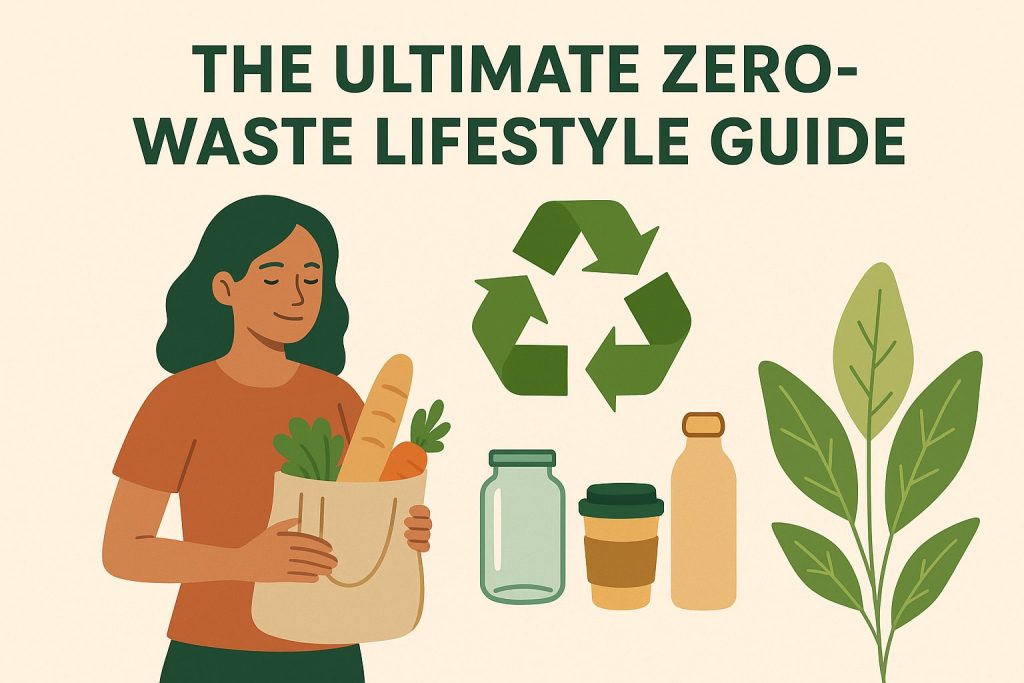Living a zero waste lifestyle might sound intense, but it’s really just a thoughtful approach to minimizing the trash you send to landfills. It’s about making conscious choices about what you buy, use, and let go of. The whole idea is guided by a simple framework called the 5 R’s—Refuse, Reduce, Reuse, Recycle, and Rot. This approach helps you create less waste, save some money, and feel good about your impact on the environment. Whether you’re just starting out or want to deepen your sustainable habits, these tips will guide you toward a simpler, more eco-conscious way of living. It’s a journey, and even taking on a small zero waste challenge can be a fantastic first step.
What Is a Zero Waste Lifestyle?
At its heart, a zero waste lifestyle is a philosophy focused on preventing trash. The goal is to keep waste out of landfills, incinerators, and our oceans by redesigning how we think about “stuff.” It’s important to remember that this is about progress, not perfection. Nobody is expecting you to fit a year’s worth of trash into a tiny mason jar overnight. The aim is to mindfully minimize waste, not achieve absolute zero.
This lifestyle connects directly to the idea of a circular economy. Instead of the typical linear model (take resources, make a product, dispose of it), a circular economy designs products for longevity, repair, and reuse. By living with less waste, you actively support this system and contribute to some major environmental benefits, like reducing pollution, conserving natural resources, and lowering your carbon footprint.

Benefits of Going Zero Waste
Adopting a zero waste mindset brings some surprisingly positive changes. The most obvious is the environmental impact—less waste in landfills means reduced ocean plastic and lower greenhouse gas emissions. But the benefits don’t stop there.
You’ll likely see financial savings, too. When you stop buying disposable products and focus on reusables, you simply buy less stuff overall. A zero waste lifestyle also supports local economies, especially when you shop at farmers’ markets and local refill stores. Finally, there’s a real sense of personal satisfaction that comes from aligning your daily actions with your values. It feels good to live a more mindful, decluttered life.
Understanding the 5 R’s of Zero Waste
The 5 R’s are the foundation of zero waste living. They provide a clear order of operations: Refuse, Reduce, Reuse, Recycle, and Rot (compost). The key is to follow them in order, because refusing and reducing are always more impactful than recycling. This framework helps you make systematic decisions about consumption and waste at every turn.
Refuse What You Don’t Need
The most powerful step is the first one: simply refuse things you don’t need. This stops waste from ever entering your home.
Think about all the little things you’re offered daily: single-use plastic bags at the store, free pens at a conference, promotional flyers, plastic straws in your drink. Politely saying “no, thank you” is a simple but incredibly effective action. It might feel a little awkward at first, but explaining your choice can sometimes inspire others to think differently, too.
Reduce Your Consumption
Next, focus on reducing what you bring into your life. Before buying something new, ask yourself a few questions: Do I really need this? Can I borrow it from a friend or neighbor? Do I already own something that could do the job?
This is especially impactful in areas like fast fashion, cheap electronics, and heavily packaged foods. Reducing also includes decluttering what you already own. By donating or selling items you no longer use, you give them a second life and prevent them from becoming trash. This connects closely to the principles of minimalism. If you’re new to this process, exploring decluttering tips for beginners can help you get started without feeling overwhelmed.
Reuse and Repurpose Items
This is where creativity comes in. Reusing means extending the life of items you already have. Instead of tossing that glass pasta sauce jar, wash it out and use it for storing bulk grains or leftovers. Old t-shirts can become cleaning rags, and a small tear in your jeans can be mended.
It also means investing in quality reusable products to replace disposables. Think cloth napkins instead of paper, silicone food bags instead of plastic baggies, or beeswax wraps instead of cling film. These swaps save money and resources over time.
Recycle Properly
Recycling is an important step, but notice it’s fourth on the list. It should be a last resort when refusing, reducing, or reusing isn’t possible.
Proper recycling means knowing what your local program accepts, cleaning containers thoroughly, and avoiding “wish-cycling”—tossing something in the bin hoping it gets recycled. It’s a sobering fact that only about 9% of the world’s plastic has ever been recycled. To make recycling more effective, you can also support the circular economy by buying products made from recycled materials.
Rot (Compost) Organic Waste
The final R is for rot, or composting. Instead of sending food scraps to the landfill where they release methane (a potent greenhouse gas), you can turn them into nutrient-rich soil.
You can compost things like vegetable peels, fruit scraps, coffee grounds, and eggshells. There are options for every living situation, from large backyard bins to small countertop systems for apartments. Many communities also have compost drop-off programs. Using compost in your garden reduces the need for chemical fertilizers, creating a beautiful, closed-loop system.
Essential Zero Waste Swaps for Beginners
Getting started is about making small, practical changes. Don’t try to change everything at once. Pick a few simple swaps, turn them into habits, and then add more.

In the Kitchen
The kitchen is often the biggest source of household waste, so it’s a great place to start.
- Reusable Bags: A set of cloth shopping bags is essential.
- Food Storage: Switch from plastic wrap and bags to beeswax wraps, silicone lids, and glass or stainless steel containers.
- Napkins & Towels: Use cloth napkins and washable dish towels instead of paper versions.
- Water Bottle: Carry a reusable water bottle to avoid buying plastic ones.
- Food Waste: Plan your meals to reduce food waste. An “eat me first” box in the fridge for items nearing their end can be a game-changer. This is where you can get into some creative zero waste cooking to use up what you have.
In the Bathroom
The bathroom is another area full of single-use plastics.
- Bars Over Bottles: Switch to bar soap, shampoo, and conditioner to eliminate plastic bottles.
- Toothbrush: Try a bamboo toothbrush or an electric one with replaceable heads.
- Razor: A safety razor is a great investment that replaces disposable plastic razors.
- Menstrual Products: Consider a menstrual cup or reusable pads.
- Cotton Rounds: Use reusable fabric rounds for makeup removal.
For On-the-Go
A little preparation makes it easy to reduce waste when you’re out.
- Coffee Cup: Bring a reusable coffee cup to your favorite cafe; many even offer a small discount.
- Utensil Kit: Keep a portable set of utensils, including a straw if you use them, in your bag.
- Containers: Carry a reusable container for leftovers when eating out or for snacks.
Smart Shopping Strategies for Less Waste
Waste prevention starts at the store. Shopping with intention is one of the most impactful zero waste lifestyle tips you can adopt. This means choosing products with minimal packaging and supporting businesses that share your values.
Buy in Bulk and Use Refill Stores
Buying from bulk bins is a fantastic way to cut down on packaging. You can bring your own clean jars and containers and buy exactly the amount you need of items like grains, nuts, spices, and even cleaning products. Just remember to weigh your container first (this is called the “tare” weight) so you only pay for the product.
Choose Package-Free Produce
Whenever possible, buy loose fruits and vegetables instead of those wrapped in plastic. Bring your own reusable produce bags or simply let items with thick peels, like bananas and avocados, go bag-free. Farmers’ markets are perfect for this, as they offer fresh, local produce and a chance to connect with the people who grow your food. This also reduces transportation emissions.
Support Sustainable Brands
Vote with your wallet by supporting companies with sustainable practices. Look for brands that use minimal, recyclable, or compostable packaging, or those that offer product return or refill programs. Choosing quality, long-lasting items over cheap, disposable ones is a core principle that saves both waste and money.
Practical Zero Waste Tips for Daily Life
Integrating these habits into your routine makes sustainable living feel effortless over time.

How can I make meal planning reduce food waste?
Meal planning is your secret weapon against food waste. Start by making a shopping list based on the meals you plan to cook for the week. Before you shop, check your pantry and fridge to see what you already have. Proper food storage also makes a huge difference in extending freshness. You can freeze leftovers or ingredients you can’t use right away. Getting creative with leftovers is a fun way to try out some great zero waste recipes.
Start Composting at Home
Composting is one of the most rewarding zero waste habits. It turns your kitchen scraps back into something valuable for the earth. Choose a method that fits your space—a backyard bin, a tumbler, or even a small worm bin under your sink. A good compost pile needs a balance of “greens” (like veggie scraps) and “browns” (like dried leaves or cardboard). Kept properly, it won’t smell bad.
Repair Instead of Replace
Our society has become very disposable. Fight back by choosing to repair items before replacing them. Learn to mend a hole in your shirt, fix a wobbly chair, or take a broken appliance to a local repair shop. This not only keeps things out of the landfill but also helps you appreciate the value of your belongings and saves money. It’s a great way to push back against throwaway culture.
Reduce Energy and Water Waste
Zero waste isn’t just about physical trash; it’s also about conserving resources. Simple habits like taking shorter showers, turning off lights when you leave a room, and air-drying your clothes can have a big impact. These actions lower your utility bills and reduce your overall environmental footprint.
Go Digital When Possible
Reduce paper clutter by opting for digital bills, statements, and subscriptions. E-books and audiobooks from the library are great alternatives to buying new physical copies. You can also use services to remove your name from junk mail lists.
Growing Your Own Food
Even if you only have a small windowsill, growing some of your own food is an empowering zero waste activity. It eliminates packaging, reduces food miles, and gives you the freshest possible produce.
Start simple with herbs like basil or mint, or try a container of lettuce on a balcony. You can even regrow green onions by placing the root ends in a jar of water. Growing food connects you to the natural cycle and closes the loop when you use your own compost to feed your plants.
Overcoming Common Zero Waste Challenges
The path to a low-waste life isn’t always smooth. It’s important to be realistic and kind to yourself. Remember, every small action counts.
Starting Small and Building Habits
It’s easy to get overwhelmed. Instead of trying to do everything at once, focus on one room or one habit at a time. If you’re feeling stuck, knowing how to start decluttering when overwhelmed can provide a gentle roadmap for tackling both physical clutter and wasteful habits systematically. Maybe start with bringing your own bags to the grocery store. Once that feels natural, add another swap, like carrying a reusable water bottle. Celebrate your small victories and don’t get discouraged by setbacks.
Dealing with Social Situations
Navigating social events can be tricky. The key is to be prepared and polite. You can bring your own container for leftovers at a restaurant or gently decline a straw at a bar. You don’t need to be preachy; often, leading by example is the most effective way to share your values without making others uncomfortable.
Finding Zero Waste Options in Your Area
Depending on where you live, finding bulk stores or composting programs can be a challenge. Start by searching online or joining local sustainability groups on social media to ask for recommendations. Don’t be afraid to ask your local grocery store if they would consider adding a bulk section or allowing customers to use their own containers. Your voice can help create change.
Zero Waste Lifestyle and Minimalism
Zero waste living and minimalism are two philosophies that go hand-in-hand. Both encourage you to live more intentionally by questioning what you bring into your life. Minimalism focuses on reducing clutter and prioritizing experiences over possessions, while zero waste focuses on reducing physical trash.

By owning fewer, high-quality items that you truly love and use, you naturally create less waste. Decluttering responsibly—by donating, selling, or repurposing—is a key part of how to become a minimalist. Ultimately, they both lead to a more conscious and fulfilling life.
Conclusion
Adopting a zero waste lifestyle is a journey of small, intentional steps. It’s about being more mindful of your impact and finding joy in living more simply and sustainably. Don’t aim for perfection; aim for progress. Each conscious choice you make, from refusing a plastic bag to composting your coffee grounds, contributes to a healthier planet.
For more thoughts on mindful and sustainable living, feel free to browse the resources here at www.notonetype.org.


Có thể bạn quan tâm
15 Minimalism Rules That Work: Simple Guide to Declutter Fast
Minimalism rules are practical guidelines that help you declutter your space, reduce decision fatigue, and...
Dec
How to Design a Minimalist Bedroom: A Complete Guide to Creating a Calm, Clutter-Free Space
A minimalist bedroom is more than just a style; it’s a mindset. It embraces simplicity...
Dec
How to Make Your Phone Minimalist: 8 Simple Steps to Reduce Distractions
My phone used to be the first thing I reached for in the morning and...
Dec
How to Create a Minimalist Home: A Practical Guide to Simplified Living
Creating a minimalist home is about so much more than just having less stuff. It’s...
Dec
How to Create a Minimalist Wardrobe: A Beginner’s Guide
Creating a minimalist wardrobe isn’t about depriving yourself of beautiful clothes; it’s about curating a...
Dec
30 Day Minimalism Challenge: A Complete Guide to Decluttering Your Life
If you’ve ever felt overwhelmed by the amount of stuff in your home, you’re not...
Dec